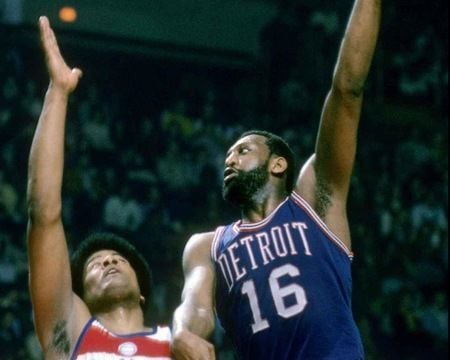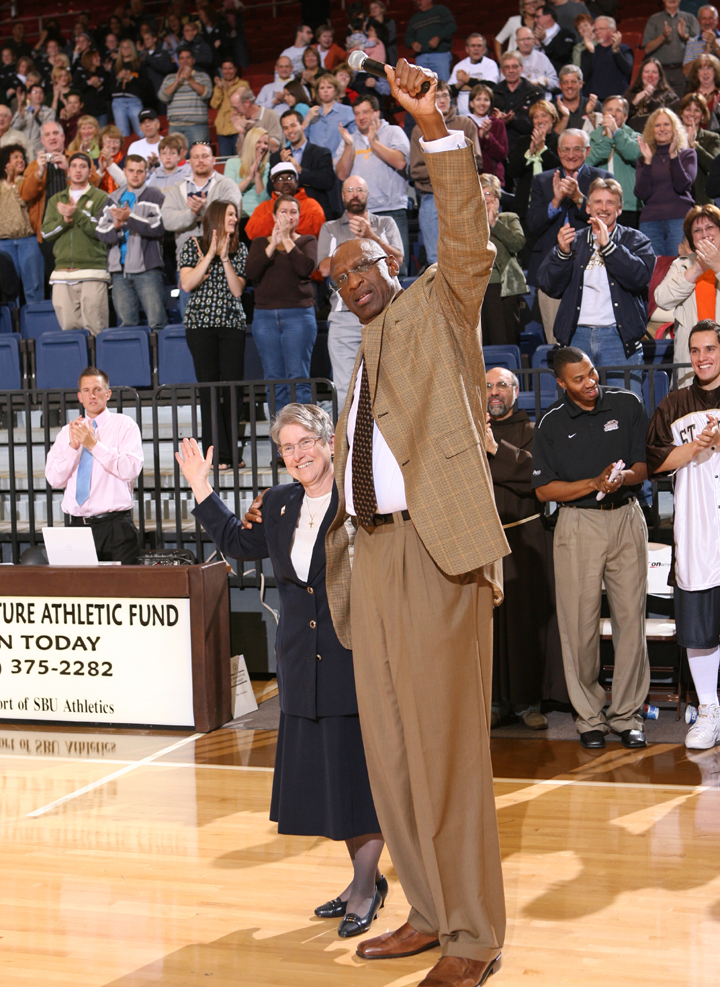Bob Lanier (Part 2)
Bob Lanier (Part 2)

Robert Jerry Lanier Jr. faced significant challenges early in his NBA career, as he battled through knee surgery and subsequent rehabilitation while still adjusting to life in the professional basketball league. Despite the adversity, Lanier displayed remarkable resilience and determination, earning recognition as a standout player for the Detroit Pistons.
Lanier's rookie season with the Pistons saw him named to the 1971 NBA All-Rookie Team, despite playing through the pain and discomfort of his ongoing knee recovery. Despite his impressive performance, Lanier reflected on the challenges he faced, acknowledging that he likely would have benefited from additional time to fully heal.
However, as Lanier regained his strength and conditioning, he quickly emerged as a star player for the Pistons, forming a formidable duo alongside teammate Dave Bing. Over the next eight seasons, Lanier consistently delivered outstanding performances, averaging over 21 points and 11 rebounds per game.
Throughout his tenure in Detroit, Lanier showcased his scoring prowess and leadership on the court, earning accolades such as his franchise-record 48-point game and his MVP performance in the 1974 NBA All-Star Game. Despite the franchise's frequent coaching changes and roster turnovers, Lanier remained a consistent force, guiding the team through various transitions.
Despite facing recurring injuries in his later years with the Pistons, Lanier's impact on the franchise was undeniable. He remains the Pistons' all-time leader in scoring average and ranks prominently in several statistical categories, solidifying his place as one of the greatest players in team history.
Throughout his illustrious career with the Detroit Pistons, Robert Jerry Lanier Jr. exemplified resilience, leadership, and exceptional skill, leaving a lasting legacy on the franchise and the NBA as a whole.
After a decade of remarkable contributions to the Detroit Pistons, Robert Jerry Lanier Jr.'s journey in the NBA took a new turn when he was traded to the Milwaukee Bucks on February 4, 1980, in exchange for Kent Benson and a first-round draft pick. Lanier embraced the move to Milwaukee, where he found himself welcomed by enthusiastic fans and surrounded by a talented roster.
In his first season with the Bucks, Lanier showcased his enduring skills, contributing significantly to the team's success under the guidance of Coach Don Nelson. Despite battling knee issues, Lanier played a pivotal role in the Bucks' consistent dominance, helping the team secure the Midwest Division championship each year during his five-season tenure.
Throughout his time in Milwaukee, Lanier formed strong partnerships with standout teammates such as Marques Johnson, Sidney Moncrief, Quinn Buckner, Junior Bridgeman, and Dave Cowens. Together, they formed a formidable lineup that made deep playoff runs, reaching the Eastern Conference Finals twice during Lanier's tenure.
Despite facing challenges with his knee injuries, Lanier remained highly effective on the court, adapting his game to accommodate reduced playing time while still making significant contributions in scoring, rebounding, assists, and steals. His leadership and experience were invaluable assets to the Bucks, particularly during critical playoff matchups./cdn.vox-cdn.com/uploads/chorus_image/image/70900418/84879401.0.jpg)
Lanier's impact extended beyond his on-court performance, as he became a respected figure in the Milwaukee community and a beloved member of the Bucks organization. He earned recognition with an All-Star Game appearance in 1982, further solidifying his status as one of the league's premier players.
Ultimately, Lanier made the difficult decision to retire from professional basketball on September 24, 1984, citing his recurring knee injuries as the primary factor. Despite the challenges he faced, Lanier's time with the Milwaukee Bucks was marked by success, camaraderie, and enduring contributions to the team's legacy.
Bob Lanier's NBA career spanned 14 seasons, during which he left an indelible mark on the league as one of the most dominant big men of his era. Despite facing persistent knee injuries that undoubtedly hindered his potential, Lanier's impact on the court was undeniable.
Throughout his illustrious career, Lanier exhibited remarkable versatility and skill, averaging an impressive double-double of 20.1 points and 10.1 rebounds per game. His contributions extended beyond scoring and rebounding, as he also showcased his playmaking ability with 3.1 assists per game, along with formidable defensive prowess with 1.5 blocks and 1.1 steals per game.
Lanier's postseason performance further underscored his greatness, with averages of 18.6 points, 9.7 rebounds, 3.5 assists, and 1.5 blocks per game in 67 playoff appearances. Despite his individual success, Lanier's teams never reached the NBA Finals, a testament to the competitive landscape of the era.
Known for his tenacity and physical style of play, Lanier earned a reputation as an "enforcer" on the court. His fierce competitiveness occasionally led to altercations, including notable incidents where he knocked out opponents or engaged in fights. However, Lanier's intensity was also a reflection of his passion for the game and his unwavering commitment to winning.
Beyond statistics and accolades, Lanier's impact transcended the hardwood, as he became a respected figure both within the league and among fans. His legacy endures as a testament to his skill, determination, and contributions to the sport of basketball.
In reflecting on Lanier's career, Hall of Famer Willis Reed aptly summarized his legacy, acknowledging him as one of the best all-around big men to ever play the game. Despite the challenges posed by injuries, Lanier's influence on the NBA landscape remains undeniable, leaving an enduring legacy that continues to inspire future generations of basketball players./cdn.vox-cdn.com/uploads/chorus_image/image/66974229/74937584.jpg.0.jpg)
References
- "Lanier Looks Back at What Might Have Been : He Put In 14 Seasons in the NBA but Has No Championship to Show for Efforts". May 19, 1985 – via LA Times.
- a b c "The Naismith Memorial Basketball Hall of Fame :: Bob Lanier". www.hoophall.com.
- ^ "Bob Lanier College Stats". College Basketball at Sports-Reference.com.
- ^ Clark, Dave (March 14, 2018). "Schmidt salutes Hall of Famer Lanier after First Four win". The Enquirer.
- ^ Bushnell, Henry (March 14, 2018). "St. Bonaventure coach dedicates emotional, long-awaited NCAA tournament win to Bob Lanier". Yahoo.com.
- ^ "1970 ABA Draft Pick Transactions". www.prosportstransactions.com.
- a b c "1970–71 Detroit Pistons Roster and Stats". Basketball-Reference.com.
- a b c Aschburner, Steve (September 10, 2018). "NBA legend Bob Lanier reflects on career, current game and impact off floor". www.nba.com. Retrieved May 11, 2022.
- ^ This week in Pistons history: Bob Lanier, Earl Tatum set franchise records
- ^ "1974 NBA All-Star Game Box Score". Basketball-Reference.com. Archived from the original on March 30, 2019. Retrieved June 28, 2021.
- ^ "Detroit Pistons Franchise Index". Basketball-Reference.com.
- "Bob Lanier Stats". Basketball-Reference.com. Archived from the original on April 3, 2013. Retrieved March 3, 2019.
- ^ "Milwaukee Bucks at Seattle SuperSonics Box Score, April 20, 1980". Basketball-Reference.com. Archived from the original on May 11, 2022.
- ^ "Milwaukee Bucks at Philadelphia 76ers Box Score, May 5, 1982". Basketball-Reference.com. Archived from the original on May 11, 2022.
- ^ "Bob Lanier Highest Scoring Games in the Playoffs". LandOfBasketball.com. Archived from the original on May 11, 2022.



































